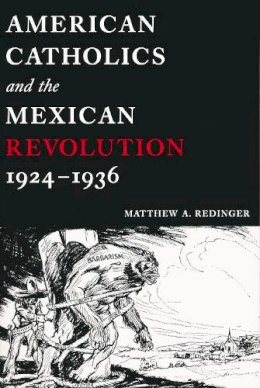Matthew A. Redinger is professor of history at Montana State University, Billings.
"Matthew Redinger's fine study is remarkable in that it will appeal not only to readers of American diplomatic history and Mexican-United States relations, buth also to those who wish to have a richer understanding of the history of the Catholic Church. With its focus on the importance of private interest groups in U.S. foreign policy, it is especially relevant to our own times." —Robert R. Swartout, Jr., Carroll College "Matthew Redinger makes a significant contribution to our understanding of U.S.-Mexican relations from 1924 to 1936. This is a book that will be important reading for scholars and students." —William Beezley, University of Arizona “Matthew Redinger's new work . . . look[s] at the ways in which specific Roman Catholic leaders and lay groups tried to influence U.S. political leaders in regard to Mexico's postrevolutionary government. Redinger shows that not all church leaders, let alone laypeople, favored involvement of any kind, yet there were those who took strong stances.” —Hispanic American Historical Review “Matthew A. Redinger describes the reaction of American Catholics to the persecution of the Church during the radical stages of the Mexican Revolution . . . . Redinger offers real insight into the troubled history of relations between Mexico and the United States.” —Catholic Southwest, A Journal of History and Culture “Probably the most significant contribution of this study is the examination of how Catholic clergy and laymen (including the Knights of Columbus) were successful in stimulating public discussion in the United States of Mexico's church-state crisis.” —The Journal of American History “This study asks important questions about the intentions of and roles played by American Catholics and the American Catholic Church during what might be termed the official anticlerical phase of the Mexican Revolution, 1924-1936.” —American Historical Review “Redinger makes a significant contribution to our understanding of the torturous path of politics, negotiation, and diplomacy that ultimately halted the war between Catholic militants and Mexico's Revolutionary government. . . . American Catholics and the Mexican Revolution will be important reading for scholars and students interested in U.S. Mexican relations, American Catholic history, the church-state conflict in Revolutionary Mexico, and the role of private interest groups in public policy-making.” —Western Historical Quarterly “This book provides a detailed account of the various methods by which the American Catholic hierarchy, clergy, and laity attempted to influence official U.S. policy toward the Mexican government's anticlericalism in the years following the Revolution of 1910-20. Redinger skillfully analyzes the interplay among different institutional levels within the far-from-monolithic Church of this period.” —The Catholic Historical Review "Events in the 1920's presented a formidable challenge to Catholics on both sides of the U.S.-Mexico border. . . In the United States, Catholic individuals and institutions searched for ways to influence foreign policy on behalf of their beleaguered coreligionists while simultaneously maintaining their hard-won bona fides as patriotic Americans in the eyes of the broader population. This able monograph by Matthew A. Redinger. . . explor[es] the complex relationships that formed the interface between public opinion and public policy in this case. . . the reader will. . . find much in these pages to stimulate thought on the author's primary target, the evolution of United States Catholic political voices." —American Catholic Studies "This in-depth study details the efforts of Catholic Church leaders, activists, and laypeople to pressure the federal government to protect the rights of Mexican Catholic coreligionists living under the anticlerical Mexican revolutionary constitution of 1917." —Choice

